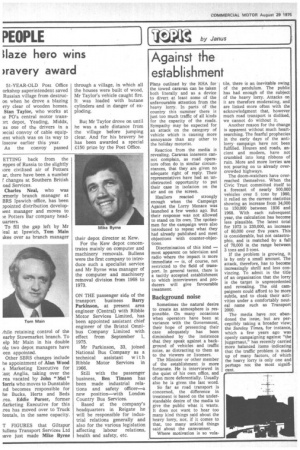Against the establishment
Page 20

If you've noticed an error in this article please click here to report it so we can fix it.
Plans outlined by the RHA for the towed caravan can be taken both literally and as a device to divert at least some of the unfavourable attention from the heavy lorry. In parts of the country this summer there is just too much traffic of all kinds for the capacity of the roads. Sympathy may be expected for an attack on the category of vehicle which is causing more annoyance than any other to the holiday motorist.
Reaction from the media is revealing. Caravan interests cannot complain, as road operators often do in similar circumstances, that they are given no adequate right of reply. Their representatives have had an unobstructed opportunity to put their case in 'isolation on the air and on the screen.
Hauliers reacted strongly enough when the Campaign Against the Lorry Menace was launched a few weeks ago. But their response was not allowed to stand on its own. The spokesmen for the campaign were also introduced to repeat what they had 'already published and meet objections with counter-objections.
Discrimination of this kind — most apparent on television 'and radio where the impact is more immediate — is, of course, not restricted to the field of transport. In general terms, there is a tacitly accepted establishment to which interviewers and producers will give favourable treatment.
Background noise
Sometimes the natural desire to create an atmosphere is responsible. On many occasions when operators have been at variance with the Government, their hope of presenting their case adequately has been diminished by the insistence that they speak against a background of vehicles and traffic noise, as distracting to them 'as to the viewers or listeners.
The Minister or other member of the establishment is more fortunate. He is 'interviewed in the quiet of his own office, and often more deferentially. Usually also he is given the last word.
So far as road transport is concerned, the difference in treatment is based on the understandable desire of the media to give the public what it wants. It does not want to hear too many kind things said about the heavy lorry, nor, if it comes to that, too many unkind things said about the caravanner.
Where motivation is so vola
tile, there is an inevitable swing of the pendulum. The public has had enough of the subject of the heavy lorry. Attacks on it are therefore moderating, and are linked more often with the 'acknowledgment that, however much road transport is disliked, we cannot do without it.
Another reason for the change is apparent without much heartsearching. The fearful prophecies in the early days of the antilorry. campaign have not been fulfilled. Houses and roads, ancient and modern, have not crumbled into long ribbons of ruin. More and more lorries are not pouring on to already overcrowded highways.
The doomwatchers have overreached themselves. When the Civic Trust committed itself to a forecast of nearly 500,000 vehicles over 5 tons by 1980, it relied on the current statistics showing an increase from 34,000 to 150,000 between 1956 and 1968. With each subsequent year, the calculation has become less plausible. The latest total for 1973 is 230,000, an increase of 80,000 over five years. This is considerable, but not catastrophic, and is matched by a fall of 70,000 in the range between 3 tons and 5 tons.
If the problem is growing, it is by only a small amount. The attack, therefore, has to become increasingly shrill and less convincing. To admit in the title of an organisation that the lorry is the target is unprecedented and revealing. The old campaigners could afford to be more subtle, and to cloak their activities under a comfortably neutral name such as Transport 2000.
The media have not abandoned the issue, but are perceptibly taking a broader view; the Sunday Times, for instance, which a few years ago was openly campaigning against "the juggernaut," has recently carried
more the items indicating that the traffic problem is made up of many factors, of which the heavy lorry is only one and perhaps not the most significant.








































































